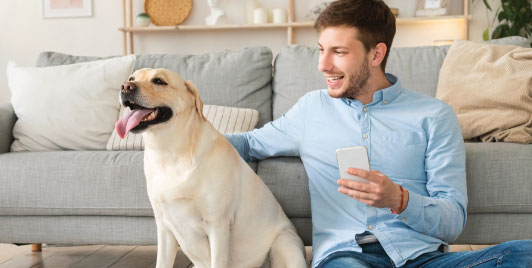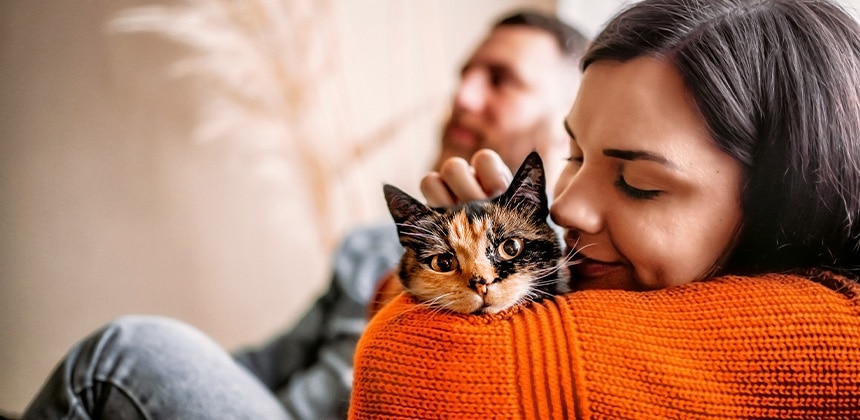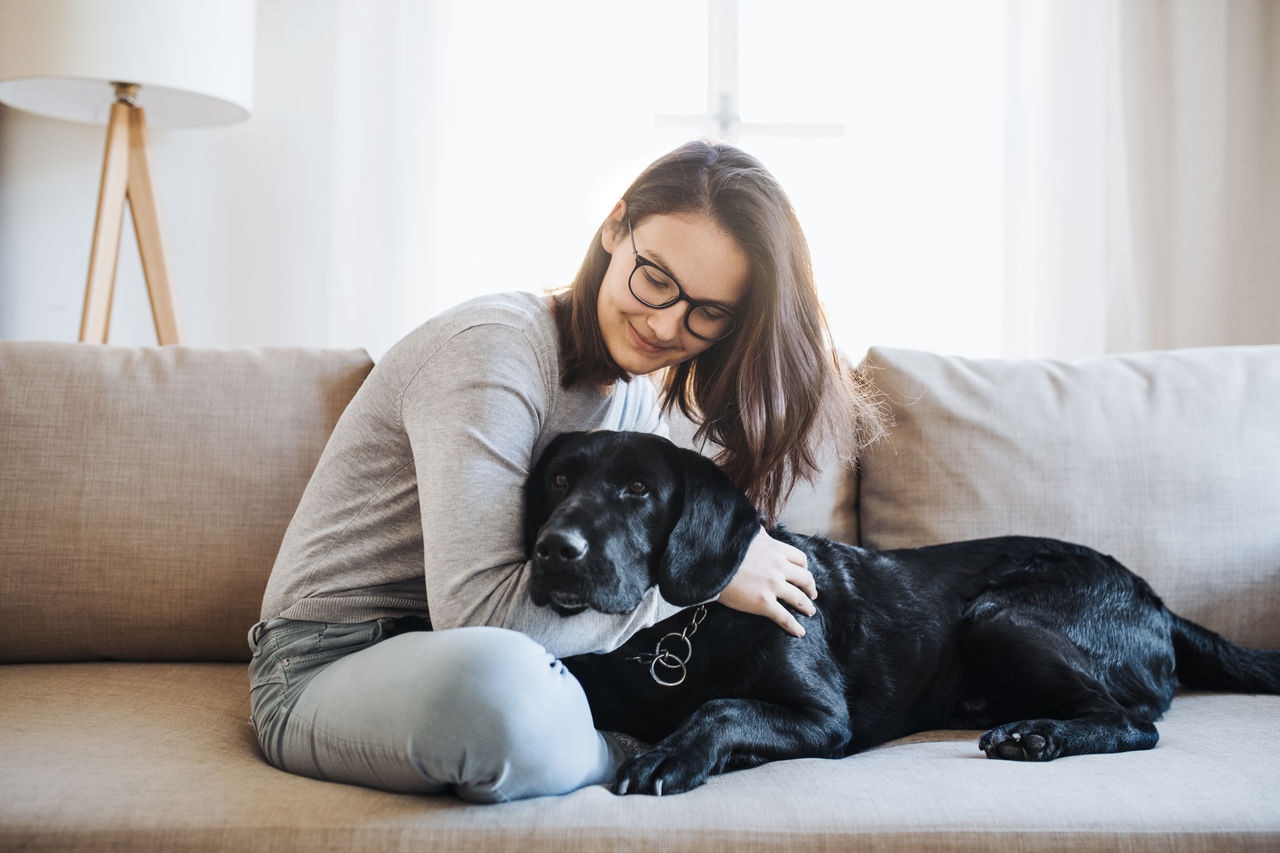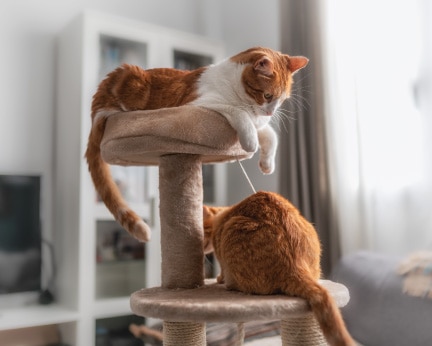- text
-
° This offer is only available for policyholders who have a registered Everyday Rewards Card linked to their eligible active Everyday Insurance policy. This offer is limited to one in-store Woolworths Supermarket transaction up to $500, with a maximum saving of $50 per Everyday Rewards Card, per month, regardless of the number of Woolworths services you use. For full T&Cs click here.
Gastroenteritis in cats and dogs.
What you need to know about gastroenteritis in your furry companion.
Pet Insurance | 5 minute read | 8 July 2025
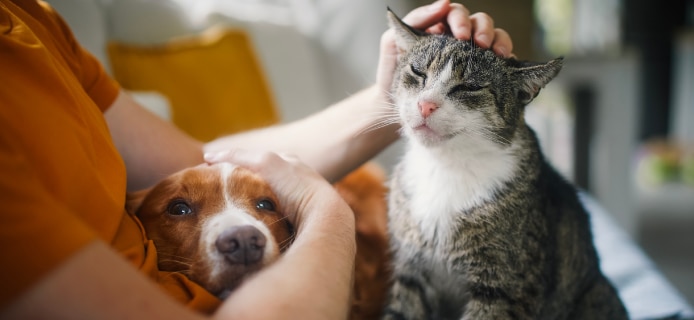
- What you need to know about gastroenteritis in your furry companion.
- What is gastroenteritis in pets?
- Types of gastroenteritis.
- Cost of treating gastroenteritis 2014-2024.
- Clinical signs of gastroenteritis.
- When to visit the vet.
- Gastroenteritis treatment options.
- Addressing underlying causes.
- The importance of prevention.
Gastroenteritis is the second most claimed condition in dogs and the most claimed condition in cats, according to PetSure claims data in 2024.*
Gastroenteritis is one of the most common conditions experienced by companion animals. It can affect cats and dogs of all ages and breeds, leading to symptoms such as vomiting, diarrhoea, dehydration, and lethargy. While it's often treatable with timely care, understanding gastroenteritis—its causes, symptoms, and available treatments—can help ensure the health and wellbeing of your furry companion.
What is gastroenteritis in pets?
Gastroenteritis refers to inflammation of the gastrointestinal (GI) tract, primarily impacting the stomach and intestines. Symptoms include vomiting, diarrhoea, lethargy, reduced appetite, abdominal pain, and dehydration. This condition, while distressing for both pets and owners, is typically manageable with proper care. However, untreated or chronic cases can lead to complications, making early detection vital.
Prevalence.
Based on PetSure claims data 2024, approximately 11.3% of all pets annually are diagnosed with gastrointestinal symptoms including vomiting and diarrhoea, with dogs being 12.3% and cats 7.9%.*
Gastroenteritis is prevalent across all life stages of cats and dogs, although it manifests differently in different pets.
| Age Group. | Kittens/Cats. | Puppies/Dogs. |
|---|---|---|
| Young pets (less than 1 year old). | 9.2% Kittens. | 13.9% Puppies. |
| Adult pets (1- 8 years old). | 6.8% Cats. | 10.2% Dogs. |
| Senior pets (8+ years old). | 8.6% Senior cats. | 12.8% Senior dogs. |
Source: Based on PetSure claims data 2024.

Types of gastroenteritis.
Acute gastroenteritis.
Acute gastroenteritis is a sudden-onset condition and is often caused by eating harmful items (e.g. table scraps or garbage), infections such as parvovirus or protozoal infection (e.g., Giardia), or even stress. Treating Giardia often includes a prolonged use of a worming agent combined with antimicrobial treatment. The average treatment cost for Giardia in 2024 was $580* but could be as high as $8,542.*
Chronic gastroenteritis.
Chronic gastroenteritis develops over time and is typically triggered by food allergies, underlying diseases, or persistent exposure to stressors. The average treatment cost for IBD (inflammatory bowel disease) in 2024 was $1,701*, with the highest amount costing $25,793.*
Trends in veterinary services or insurance claims related to gastroenteritis have increased over time.
Cost of treating gastroenteritis 2014-2024.
The average cost for treatment in dogs in 2024 was $737*, with the highest cost for treatment being $32,310.* For cats, the average cost for treatment was $735*, with the highest cost for treatment being $26,987.*
| Treatment year. | Avg treatment cost in dogs.^ | Avg treatment cost in cats.^ |
|---|---|---|
| 2014 | $439 | $453 |
| 2015 | $457 | $451 |
| 2016 | $478 | $510 |
| 2017 | $489 | $484 |
| 2018 | $502 | $541 |
| 2019 | $515 | $523 |
| 2020 | $548 | $555 |
| 2021 | $574 | $558 |
| 2022 | $619 | $623 |
| 2023 | $702 | $671 |
| 2024 | $738 | $737 |
^ Based on PetSure claims data 2014-2024.
Clinical signs of gastroenteritis.
Recognising the symptoms early is crucial for effective treatment. Vomiting, diarrhoea, fatigue, dehydration and loss of appetite are primary indicators.
Common gastroenteritis symptoms in cats and dogs to watch for:
Sunken, dry-looking eyes.
Dry nose.
Loss of skin elasticity.
Dry, sticky gums.
Thick saliva.
Reduced energy levels and lethargy.
Panting.
Diarrhoea.
Loss of appetite.
Vomiting.

Key differences in how cats and dogs present symptoms include:
Dogs: more prone to vomiting and may exhibit drooling.
Cats: tendency to hide, stop grooming, or reduce physical activity.
When to visit the vet.
Not all cases of gastroenteritis are emergencies but knowing when to act is critical. Severe symptoms, such as persistent vomiting, blood in stool/vomit, or signs of extreme dehydration, should prompt immediate veterinary attention. As a first port of call, you can consult telehealth to see if your pet's symptoms can be managed at home or if your pet needs urgent in-clinic care.
What to expect at the vet if your dog has gastroenteritis.
When you take your pet to a veterinarian for possible gastroenteritis, they'll review your pet's history and perform a full nose-to-tail physical examination. A detailed history from the pet owner is also valuable. The vet may ask you questions regarding your pet's diet, recent exposure to toxins, behavioural changes or travel history to help narrow down potential causes.
For persistent cases, elimination diets or gastrointestinal biopsies may be necessary to uncover potential food allergies or to accurately determine the underlying cause of the gastrointestinal issue.
Diagnostics.
To confirm gastroenteritis and rule out other underlying conditions, a variety of diagnostic tests may be conducted.
Early and accurate diagnosis not only ensures appropriate treatment but also minimises the risk of complications, especially in vulnerable groups like young or senior pets.
Faecal analysis: Identifies the presence of parasites, bacteria, or viral infections.
Blood work: Evaluates organ function and deficiencies, also checks for signs of dehydration, infection, or inflammation.
Imaging (X-rays or Ultrasound): Helps detect blockages, foreign bodies, or abnormalities in the gastrointestinal tract.
Endoscopy: Allows visual examination of the GI tract and, in some cases, biopsy collection to investigate chronic or severe cases and to retrieve some foreign bodies.
Treatment costs.
Here are some of the typical costs involved in diagnosing and treating gastrointestinal conditions, by treatment type, based on PetSure claims data 2024.
| Treatment. | Avg treatment cost in dogs. | Avg treatment cost in cats. |
|---|---|---|
| Blood Test. | $186 | $206 |
| Faecal Tests. | $166 | $229 |
| Fluid Therapy. | $124 | $125 |
| Procedure Fee: Endoscopy. | $778 | $911 |
| Procedure Fee: Radiology. | $259 | $254 |
| Procedure Fee: Ultrasound. | $379 | $469 |
Source: PetSure claims data 2024.
Gastroenteritis treatment options.
Treatment for gastroenteritis depends on its underlying cause and severity. Mild cases may resolve with supportive care, while moderate to severe cases require more tailored interventions. Below are common approaches to managing gastroenteritis in pets.

Supportive care.
Fluid therapy.
Rehydration is vitally important, often achieved through subcutaneous or intravenous fluids to replace lost electrolytes. (Avg cost $166 based on 2024 PetSure claims data).
Dietary management.
A temporary switch to a bland diet, such as boiled chicken and rice, or prescription GI-friendly food can help soothe the stomach while promoting recovery. Gradual reintroduction of their regular diet is key to avoiding a relapse.
Medications.
Antiemetics: Help control vomiting and reduce nausea.
Probiotics: Assist in restoring a healthy gut microbiome, especially after infections or antibiotic treatments.
Antibiotics or antiparasitics: Prescribed in cases involving bacterial infections or parasites.
Addressing underlying causes.
For more severe or chronic cases of gastroenteritis, addressing the root cause is essential. For example, pets with food allergies may require long-term dietary adjustments, while those with organ dysfunction may need additional medical management.
The importance of prevention.
Gastroenteritis is a common but manageable condition in cats and dogs. Early detection, proper care, and preventive measures can significantly improve your pet's quality of life. Understanding age-related differences in presenting conditions and seeking timely veterinary attention can help ensure that your pet's health remains a priority.
For additional insights on common pet conditions and the costs of veterinary care, consult your vet or explore Everyday Pet Insurance coverage options to help protect your furry family members.
How Everyday Pet Insurance can help.
Unexpected vet bills can be stressful. Pet Insurance can help cover the costs of diagnosis, treatment, and medication for various health conditions.
Here are some benefits you can enjoy with your Everyday Pet Insurance policy:
Other articles you might like.
Help protect your loyal companion and get 10% off an in-store Woolworths shop every month°
* Based on PetSure claims data 2024, as at April 2025. Amount claimed per policy over a 12-month period.
^ Based on PetSure claims data 2014-2024.
- text
-
† Offer available to new Everyday Pet Insurance policyholders, and is limited to 1 membership per eligible policy. The free membership offer (valued at $199p.a) is from the date of your policy commencement, provided your Everyday Pet Insurance policy remains active. You are not eligible to redeem the free membership subscription for cash or credit. VetAssist is a separate subscription based service to the Everyday Pet Insurance product, and is provided independently by Everyday Insurance third party service provider, VetChat Services Pty Ltd (VetChat). Click here for full VetAssist Service terms and conditions. Everyday Insurance reserves the right to vary or remove this offer at any time and will provide reasonable notice of any such changes.
- text
-
= The gap is defined as the difference between the vet's invoice and the claim benefit under your policy. Policy terms and conditions apply. GapOnly® is only available at participating Vets. Please visit GapOnly® to search for GapOnly® enabled vets. GapOnly® is a trademark owned by PetSure (Australia) Pty Ltd (PetSure) (ABN 95 075 949 923, AFSL 420183).
- text
-
** Offer is valid until 1 July 2026 (Offer Period). This entitles you to a 30% discount off your prescription medication purchase from PetScripts Pty Ltd ABN 73 610 444 427 (PetScripts) whilst your policy remains in force during the Offer Period and cannot be used in conjunction with any other offer. This offer only applies to medication prescribed to the pet insured under Everyday Pet Insurance Policies. Services provided by PetScripts are separate to your pet insurance policy. The 30% discount offer is subject to PetScripts' general Terms and Conditions, including the Privacy Policy which are available online at www.petscripts.com.au. Everyday Pet Insurance may withdraw or extend this offer at any time without notice.
- text
-
Everyday Pet Insurance policies entered into for the first time prior to 17 July 2023 and subsequent renewals of those policies are issued by The Hollard Insurance Company Pty Ltd ABN 78 090 584 473, AFSL 241436 (Hollard), arranged and administered by PetSure (Australia) Pty Ltd ABN 95 075 949 923, AFSL 420183 (PetSure) and promoted and distributed by Hollard’s Authorised Representative (AR) Woolworths Group Limited ABN 88 000 014 675, AR 245476 (Woolworths).
Everyday Pet Insurance policies entered into for the first time on or after 17 July 2023 and subsequent renewals of those policies are issued by PetSure and promoted and distributed by PetSure’s AR, Woolworths.
Any advice provided is general only and does not take into account your individual objectives, financial situation or needs. Please consider the Product Disclosure Statement (PDS) to ensure this product meets your needs before purchasing, or choosing to continue with the product. PDS and Target Market Determination available at insurance.everyday.com.au/pet-insurance.

